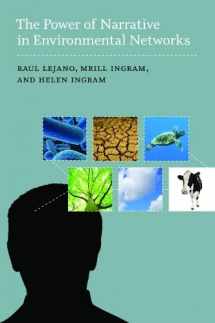
The Power of Narrative in Environmental Networks (American and Comparative Environmental Policy)
ISBN-13:
9780262019378
ISBN-10:
026201937X
Author:
Raul Lejano, Helen Ingram, Mrill Ingram
Publication date:
2013
Publisher:
Mit Pr
Format:
Hardcover
225 pages
FREE US shipping
Book details
ISBN-13:
9780262019378
ISBN-10:
026201937X
Author:
Raul Lejano, Helen Ingram, Mrill Ingram
Publication date:
2013
Publisher:
Mit Pr
Format:
Hardcover
225 pages
Summary
The Power of Narrative in Environmental Networks (American and Comparative Environmental Policy) (ISBN-13: 9780262019378 and ISBN-10: 026201937X), written by authors
Raul Lejano, Helen Ingram, Mrill Ingram, was published by Mit Pr in 2013.
With an overall rating of 3.9 stars, it's a notable title among other
books. You can easily purchase or rent The Power of Narrative in Environmental Networks (American and Comparative Environmental Policy) (Hardcover) from BooksRun,
along with many other new and used
books
and textbooks.
And, if you're looking to sell your copy, our current buyback offer is $0.36.
Description
Theory and case studies demonstrate the analytic potential of mutually constitutive “narrative networks” in environmental governance.For as long has humans have lived in communities, storytelling has bound people to each other and to their environments. In recent times, scholars have noted how social networks arise around issues of resource and ecological management. In this book, Raul Lejano, Mrill Ingram, and Helen Ingram argue that stories, or narratives, play a key role in these networks―that environmental communities “narrate themselves into existence.” The authors propose the notion of the narrative-network, and introduce innovative tools to analyze the plots, characters, and events that inform environmental action. Their analysis sheds light on how environmental networks can emerge in unlikely contexts and sustain themselves against great odds. The authors present three case studies that demonstrate the power of narrative and narratology in the analysis of environmental networks: a conservation network in the Sonoran Desert, which achieved some success despite U.S.-Mexico border issues; a narrative that bridged differences between community and scientists in the Turtle Islands; and networks of researchers and farmers who collaborated to develop and sustain alternative agriculture practice in the face of government inaction. These cases demonstrate that by paying attention to language and storytelling, we can improve our understanding of environmental behavior and even change it in positive ways.


We would LOVE it if you could help us and other readers by reviewing the book
Book review

Congratulations! We have received your book review.
{user}
{createdAt}
by {truncated_author}


